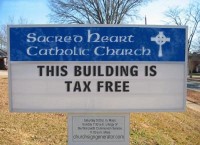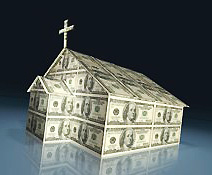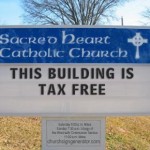 In the United States, churches do not have to pay property taxes. This is a great benefit to churches, especially when church budgets are tight.
In the United States, churches do not have to pay property taxes. This is a great benefit to churches, especially when church budgets are tight.
But have you ever wondered why churches are given tax-exempt status? It has nothing to do with the separation of church and state. The reason churches are given tax-exempt status is the same reason that any other non-profit organization (whether religious or not) is given the same status: they engage in charitable work that benefits the community. The government wants to encourage people to be charitable, and so gives tax-exempt status to charitable organizations.
Therefore, if a church is not engaging in charitable service in the community, it is reasonable to ask them to surrender their tax-exempt status. Churches, like any charitable organization, should only get tax-excempt status if they can show where and how they are providing a service to the community.
“But,” a church might say, “We cannot afford to do much in the community. We are barely paying our bills as it is.”
 I understand, but is this what you would tell the government if they stepped in and said “Start serving the community or start paying your taxes”? In such a situation, you would quickly find the resources to start serving your community in a tangible way. (By the way, we may soon have no choice in the matter. See this article here.)
I understand, but is this what you would tell the government if they stepped in and said “Start serving the community or start paying your taxes”? In such a situation, you would quickly find the resources to start serving your community in a tangible way. (By the way, we may soon have no choice in the matter. See this article here.)
And how much money should be budgeted for service to the community? The place to start, it seems, might be whatever the church would be paying in taxes if they were not tax-exempt.
So no, I am not really suggesting you revoke your tax-exempt status. You can, if you really want to, but in general, churches are better stewards of money than the government. I believe, however, that churches should act like they pay taxes, and then take that “tax money” and use it in tangible ways for the good of the community.

How much money would this be per year?
The national average for property taxes is about 3%. So if your church and property is worth $500,000, you would “tax” yourself $15,000 per year to pour back into the community.
Imagine what you could do in your community with $15,000! What needs do people petition the local government for, but which the county coffers cannot afford? Can the church help out? What would the city council say if you showed up with $10,000 to help renovate the school, fix that road, or clean that park? Why don’t you go and find out?
If this idea caught on around the country, we could solve many problems around the world. It is estimated that the total value of church buildings and property in the United States is about $500 billion. If churches decided to tax themselves at 3% annually, this would create $15 billion per year that the church could use to help the people of our country and others around the world.
When you listen to politicians argue about whether the country can afford to cut just $4 billion out of the annual United States budget, it become mind boggling to realize that if churches would just tax ourselves, the church could be spending $15 billion per year on community service in our communities and elsewhere.
On a related note, it was reported in 1986 that churches around the country had a total annual income from tithes of over $100 billion. If churches taxed this donation income at a rate similar to the corporate tax rate (averaging about 20%), this could generate an additional $20 billion per year to use for the kingdom of God.
All of this is only to point out that the church has lots of money, and we should make careful, wise decisions about how we spend it.
So keep your tax-exempt status, but tax yourself what you would be paying if you were not tax-exempt, and then use that money in all the ways government would use it, but with the love of Jesus added in. In such a way, the world will be turned upside down.




Our church has been doing a “project” to raise money for a new building. It has caused people to feel pressure and has caused tension where there should be unity. We have something called “The City” that is used for community purposes to keep us in touch etc.
After a post was put out about the “project” one person posted a response saying, “feed my sheep, don’t bleed my sheep.” How profound!
Where is a house we could build for Him? We are the temple and he jealously desires His Spriit to dwell within us!
We need to be about the Great Commandment and the Great Commission. I’ts about making disciples. What happened to loving the Lord with all our hearts, all our minds, all our souls and with all our strength?
The church in acts gave as anyone had need. We are talking needs here. Not fancy buildings made with hands. God is Jehova Jirah, our provider. If we really need a bigger building He will provide. He will not pressure us because He loves a cheerful giver. 🙂
Let us break bread together on our knees.
I like that saying about the sheep. Ha! It is so true.
I think that there are times and places where a building is necessary, but only with great care and caution. The worst reason in the world to build a new buildings is “because we can” or “because if we don’t, the church down the road with the new building might get our people.” However, if a church knows that a building will help expand their mission, I’m not opposed to it.
I will talk more about this on Thursday and Friday of this week.
Maybe you’ll get a good discussion on this one. I live in California. I discussed this topic extensively with a county tax assessor a few years ago. He said California law allows nonprofits to avoid property taxes if they are using their property exclusively for non profit purposes. In the case of a church, that would mean that they are using their property exclusively, 100%, for non-profit purposes.
Some examples he gave: a church women’s exercise class met in the sanctuary a couple of days a week. The women who led the class charged a few dollars, which went into their pockets. The assessor’s office revoked the tax-exempt status of that portion of the property, since it was being used to produce a profit for someone part of the time.
Per this assessor, California law allows this interpretation, which is applied as best seen fit by each county assessor’s office. His office also looked at issues such as renting the fellowship hall for weddings or other events. Churches that could not demonstrate that all monies charged were directly used to cover costs were in danger of losing their tax exempt status for the building.
Having been a government employee, I would as soon give cash to a heroin addict as I would to any level of government. Both have similar cash-managing skills. However, like it or not, many of the tax exemptions that “non-profits” enjoy are probably on the verge of extinction. Government has a never-satisfied and ever-increasing appetite for money. Basing Christian “ministry” on some form of a “temple theology” will most likely become a more expensive proposition in the not too distant future.
I’m not so obtuse as to think that any level of government cares a whit what I think, but I think if government must tax non-profits, a good place to start would be with new property, including new buildings, that non-profits acquire or construct, and for all property, including buildings, that is not used exclusively for non-profit activities that are available to any and all who wish to participate. Perhaps such a strategy might help non-profits rethink their addiction to real estate holdings.
What do you think? Does giving churches lots of tax breaks (real estate tax exemptions are only one of many) hearken back to the Roman Empire in the fourth century, when Christianity was made the official religion of the state? Rome provided the temples and paid the priests, if I understand correctly. So of course the church and the priests Kowtowed to Rome. Is the current state partially supporting religion in giving it numerous tax breaks, and does this cause religion to Kowtow to the state? If you take Caesar’s money, don’t you have to dance to his music?
Great questions. I currently work for the Government.
Someone once said that the three greatest evils in the world are religion, government, and money.
I like to joke that I work for two of those to get the third.
I do think that the tax-exempt status for churches goes back to imperial Rome, and that many churches use their buildings for many things that are not “non profit” purposes.
It would be interesting to see what would happen to the churches all across our country if the government started taxing them. Oooh, the outcry!
But with our cash-strapped country the way it is, something’s gotta give somewhere. It will be interesting to see what Washington DC decides.
I like your proposal about starting with new property and new construction. That right there will make churches think twice about spending their money on a new building they may not actually need.
Our church bought a house to use as a meeting hall; after the purchase, the church was denied a permit to meet because in order for 30 or more people to meet, the proporty zoning stipulates that the footprint has to be greater than 15 thousand sq. ft. We are AT 15K sq ft, and two variances requests have been denied. Now the elders demolished the property, subdivided the land, and developed a home which the church will sell, and then build another two homes in the subdivision. Hopefully to generate enough funds to buy a meeting hall. Will the ‘real estate development’ flavor of this venture compromise our 501(c)3 status? Is this even legal? the mls listing lists the church as the owner. I am concern. Please, help!
You are going to need a Real Estate Lawyer for that, or at least a non-profit lawyer. I am no expert on either.
It is a sad story.
You are only 30 people right now. Do you really need to purchase a meeting hall, or even a home to meet in? 30 people meet all the time in various homes. I think the city just has problems if they meet there regularly, say once a week. So move around, from house to house that the people already own (their own homes). Then, keep the building you have just purchased, and use it to meet some sort of need in the community. Are there lots of single moms? How about a discount daycare? Are lots of people out of work? How about job counseling? etc. What you use the building for is determined by the needs of the community, and the skills and knowledge of the 30 people.
Going this way keeps you from having to sell the current property, buy a new property, and definitely avoids any possibility of losing your 501(c)3 status because you have begun to develop the land.
Our founding fathers made religious ministries tax exempt straight out of the Bible:
Furthermore, be aware of the fact that you have no authority to impose tax, tribute, or toll on any of the priests, the Levites, the musicians, the doorkeepers, the temple servants, or the attendants at the temple of this God.(Ezra 7:24)
The 350 Founding Fathers of the US were deeply orthodox Christians. Maybe 3 were non-Christians. Those 3 are the ones that the media holds up as proof of the secularization of US society. I’ll probably do a blog series on the proof Christian foundations of the US. Boy how far we’ve fallen.
I was not aware of this! But of course, we do tax pastors, and music leaders, and the ushers, deacons, and elders. I wish they would have made laws about that! Ha ha.
I think they did make laws about that. As long as they were paid by the ministry, they were tax free from that income. Now there are a million regulations to “keep” your tax-exempt status. They’re just waiting for you to mess something up. Like you can’t preach politics from the pulpit! That’s what they did for the first 100 years of America!
Yes, the whole separation of church and state thing is very misunderstood today.
i just want to say we need to keep Gods laws in the church & not mans